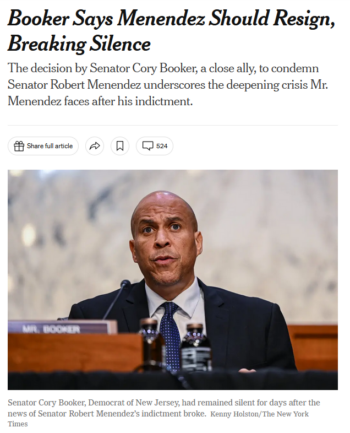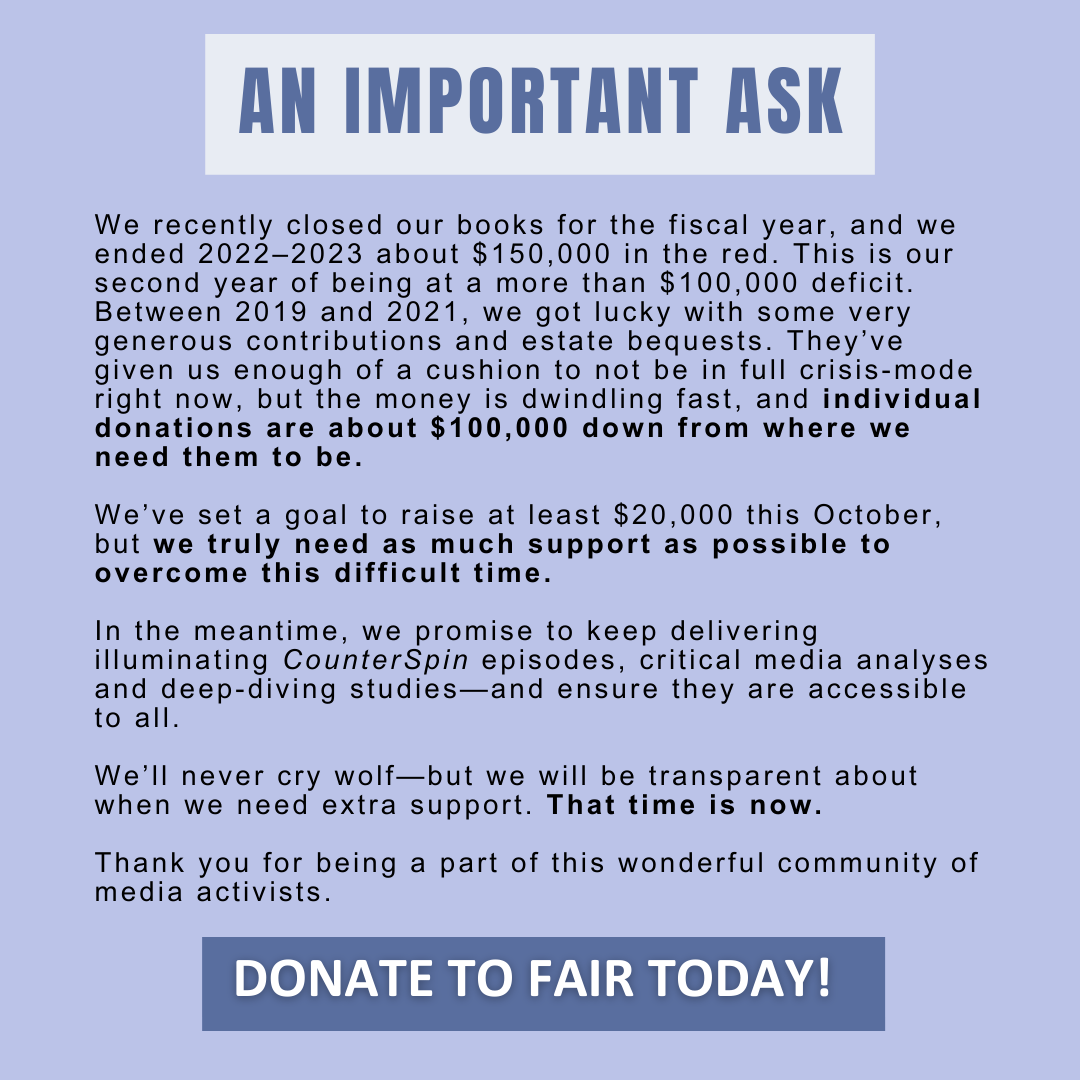Janine Jackson interviewed the University of San Francisco’s Stephen Zunes about the indictment of Sen. Robert Menendez for the September 29, 2023, episode of CounterSpin. This is a lightly edited transcript.
Janine Jackson: Major news media outlets have been putting out numerous stories on the federal indictment of Robert Menendez, Democratic senator from New Jersey and chair of the Senate Foreign Relations Committee. Those stories are overwhelmingly on details of the charges of suspect dealings—interesting, important information—and on the support, or lack thereof, from other congressmembers, also undoubtedly meaningful information.

New York Times (9/26/23)
The September 27 New York Times explained that
Mr. Menendez was charged on Friday with using his power as chairman of the Foreign Relations Committee to assist the government of Egypt and businessmen in New Jersey in exchange for bribes that included bars of gold bullion, a Mercedes-Benz convertible, exercise machines and more than $500,000 in cash.
That sentence says a little more than it says, in that it reflects US media’s evident prioritizing of details of the alleged corruption—What did he get? Gold, halal meat?—over interest in the impact on human beings who are not Robert Menendez or his wife or her friends, or any businesspeople who got cut a sweet deal—anyone who might be affected by this assistance to the government of Egypt.
We are still in the midst of it, of course, but so far, anyway, media seem more interested in what the Times called the “deepening crisis Mr. Menendez faces” than what it means for anybody else.
Stephen Zunes is a professor of politics at the University of San Francisco. His most recent book, co-authored with Jacob Mundy, is Western Sahara: War, Nationalism and Conflict Irresolution, out now in an updated, expanded edition from Syracuse University Press. He joins us now by phone from the Bay Area. Welcome back to CounterSpin, Stephen Zunes.
I am absolutely going to ask your thoughts about the indictment and its implications, but I wanted to do just a little history first, because it hasn’t been front and center in current coverage, and that context is important.
You wrote back in January of 2021, when Democrats selected Robert Menendez as chair of the Senate Foreign Relations Committee, that that decision “rung alarm bells for advocates of peace, human rights and international law.” So why was that true already then, and were there particular issue areas that drew concern?
Stephen Zunes: There are quite a number. I mean, the brazenness, the jaw-dropping nature of the charges against Senator Menendez, as you noted, are great tabloid fodder. They’re quite extreme. This is not just the official corruption, legal corruption, we see, especially since the Citizens United decision at the Supreme Court, of influencing politicians. This is really old school, in terms of the cash, the gold bars and everything else.
And he’s had something of a reputation in New Jersey politics for the corruption. He was indicted some years ago on corruption charges, and it ended in mistrial with a hung jury. But despite this, the Democrats named him chair of the Senate Foreign Relations Committee.

Sen. Frank Church (holding poison dart gun) with Sen. John Tower (Levin Center).
But my concern back then, as with a lot of us, was not on just the corruption per se, but he is one of the most hawkish, hard-line Democrats in the United States Senate. And he was put in the very powerful position of being head of the Senate Foreign Relations Committee.
Now, historically, the Democratic heads of the Senate Foreign Relations Committee have actually tried to curb excesses and militarism, excesses in terms of supporting human rights violators and the like. We think back to J. William Fulbright, who was the leading critic, not just of Nixon, but of Lyndon Johnson, in terms of the war in Vietnam. We think of Frank Church in the 1970s, challenging the abuses by the CIA and other intelligence agencies. We think of Claiborne Pell and others, in terms of checks and balances, which unfortunately there are not a lot of in foreign policy, but at least to some degree, we could have it through the Senate Foreign Relations Committee, when the Democrats have been in charge.
But in choosing Menendez, Schumer and the Democrats went in the opposite direction—someone who has been to the right of even these centrist Democratic presidents.
So Menendez was one of only two senators, Senate Majority Leader Chuck Schumer being the other one, to vote against the Iran nuclear agreement. He attacked Obama from the right, in terms of his attempts at normalization of relations with Cuba.

Stephen Zunes: “Menendez…has been one of the most vocal supporters of US support for authoritarian right-wing governments.”
The latter is particularly ironic, because Menendez has been obsessed with the authoritarianism and human rights abuses under Cuba’s Communist government, but he has been one of the most vocal supporters of US support for authoritarian right-wing governments with far worse human rights abuses, including that of Egypt.
I think the big thing that the mainstream media are really missing here is not just that he apparently received bribes from a foreign government, but one that has a particularly nasty human rights record. And even without the apparent illegal activity, why in the hell is the United States supporting this government in the first place?
Let’s remember that Egypt gets more US foreign aid, more arms and ammunition and security assistance, than any country in the world, save for Ukraine and Israel.
And the government of Egypt is one of the absolute worst in terms of its human rights abuses. Since Sisi seized power nearly a decade ago, literally thousands of demonstrators have been slaughtered in the streets.
There are over 60,000 political prisoners, one of the highest, if not the highest, number of political prisoners anywhere in the world. And these aren’t just Islamist radicals or anything else, far from it. Many of these people are nonviolent, liberal, secular activists, the very people who led the nonviolent uprising in 2011 against the previous US-backed dictator, Hosni Mubarak.
We’re talking about torture on an administrative basis, not to mention corruption up the wazoo. This is a horrific government.
And yet, for years, we’ve had bipartisan support, both in Congress and in successive administrations, for supporting this regime. Now, there has been some growing concerns in some circles, particularly among progressive Democrats, but even among a handful of Republicans and others. But why the hell are we supporting this kind of regime?
And Menendez, as head of the Senate Foreign Relations Committee, while occasionally giving lip service to human rights, has been steadfast in supporting this kind of aid. And, indeed, part of this indictment appears to be that in return for some of these lucrative gifts, he worked to lift a hold on $300 million worth of military aid that was being temporarily withheld on human rights grounds.
But the problem here, again, is not just the bribes and corruption by Menendez, but the very question that we really need to be asking is, why are we supporting this regime in the first place?
JJ: Absolutely. Well, let me just add to that, frankly, because I looked at a headline from September 14 of this year from the New York Times, “Choosing Security Over Rights, US Approves $235 Million in Egypt Aid.” And it was, “Secretary of State Blinken overruled congressional restrictions on US military aid tied to Egypt’s dismal human rights record.”
OK, that’s interesting. But then I see another headline, “Despite Egypt’s Dismal Human Rights Record, US Restores Military Aid,” and that headline is from 2018. So there’s been this kind of yes/no/but, and it still has added up to millions of dollars of aid.
SZ: This is all too familiar. Some of us can think back to the 1980s, when the Reagan administration would claim they were concerned about human rights, and were pushing for human rights reforms in various Latin American dictatorships that were promoting death squads and the like. This is the same kind of thing.
But the problem is, is that a lot of Democrats, even liberal Democrats, who have been willing to raise human rights concerns when Republicans are in the White House, seem to be rather quiet when there’s a Democrat in the White House. So there’s this feeling we see, and I certainly find this in online discussions and elsewhere, that so much of the criticism about the Biden administration from the right is so silly and outrageous, and given a very real threat of authoritarianism from the Republicans, people are so reluctant to say anything negative about Biden, that much of the left liberal wing of the spectrum of this country seems to be ignoring the kinds of abuses that would’ve mobilized people, were they being supported by Republicans.
And, again, it’s not just Egypt, and this is really important. Menendez, as head of the Senate Foreign Relations Committee, has been a fanatically strong supporter of the Netanyahu government in Israel and the Israeli occupation. He has attacked the United Nations, Amnesty International, Human Rights Watch, the International Court of Justice, the International Criminal Court, virtually anybody who dares document or investigate violations of human rights or international humanitarian law by the Israeli government.
And most Democrats at this point are starting to be, though very pro-Israel, more on the J Street end of the Zionist spectrum—that is, those that strongly support Israel as a Jewish state, but oppose the occupation and settlements. But Menendez is aligned with AIPAC and the Republicans, the right wing of the Zionist movement, in a totally unapologetic way, which is way, way to the right of average Democratic public opinion, in terms of the rank and file voters.
But it’s not just Israel. He supports the Moroccan occupation of Western Sahara. He is one of the few who’s openly supported Trump’s recognition of Morocco’s annexation of the entire nation of Western Sahara, along with Israel’s illegal annexation of the Golan Heights. And here’s a guy who talks about, “Oh, Russia cannot unilaterally change international borders. They cannot expand their territory by force,” in reference to Ukraine. That’s certainly true. But then he says, it’s OK if a US ally does it.
And just like his statements on human rights, criticizing them in Cuba and other left-leaning countries, but excusing them or even supporting them in terms of right-wing US allies, his attitude on international law is the same way. Violations of international legal standards, the UN charter, that’s a horrible thing if a country we don’t like, like Russia, does it. But if it’s an ally, like Israel and Morocco, it’s OK.
And this is not what most Americans, especially most Democrats, want. Again, if you look at the public opinion polls, a vast majority of Americans, particularly on the Democratic side, believe that international law should be enforced consistently.
Just as you would not want a Democratic attorney general to only prosecute Republicans, or a Republican attorney general to only prosecute Democrats, same thing with international law. Law is the law. You can’t pick and choose, depending on the political or geostrategic orientation of the offender.
JJ: Right. Well, against that backdrop, I think the fact that Menendez—who, as we’re recording on September 28, has pled not guilty; we’re still in medias res—but he says that the federal prosecutors are “misrepresenting routine congressional work.” And in the context of what you’ve just said, I feel like that should set off an alarm for an independent press corps, that he’s even comfortable saying, “Well, this is just what you do when you’re a congressperson.”
SZ: Yes. It is concerning that, even without this apparent illegal activity, even without its rather brazen nature, the fact is that it is really a scandal that the United States continues to support repressive regimes like Egypt, like Bahrain, like Saudi Arabia, like United Arab Emirates, like Morocco. They continue to support the Israeli/Moroccan occupations. We can go down the list.
There’s probably no single issue in foreign or domestic policy where public opinion and US policy is so widely differentiated. Most Americans really do feel pretty strongly about human rights.
Indeed, it’s what we hear all the time. It drives me crazy to hear the mainstream media, without irony, talking about how Biden is standing up for human rights, or standing up for international law, without mentioning that the United States arms 57% of the world’s dictatorships, 57% of the world’s authoritarian regimes receive US military aid or arm sales. And this doesn’t even count the countries that are nominally democracies, like Israel and India and others, which are also engaging in human rights abuses.

Syracuse University Press, 2023
So I think that the scandal, on the one hand, shows a failure of the mainstream media to recognize the larger structural problem. But on the other hand, I think it provides an opening for those of us who do care about human rights, who would like to see US foreign policy as actually more consistent with our stated values, to raise these issues and to challenge, not just these corrupt politicians like Menendez, but the whole system that ends up supporting these autocrats and occupiers, and the kind of system that would put a man like Menendez in charge of our foreign policy in Congress, the Democrats’ de facto foreign policy spokesperson, in that kind of position in the first place.
JJ: I’m going to end on that note. We’ve been speaking with Stephen Zunes, professor of politics at the University of San Francisco. His most recent book, co-authored with Jacob Mundy, is Western Sahara: War, Nationalism and Conflict Irresolution, out now from Syracuse University Press. Stephen Zunes, thank you so much for joining us this week on CounterSpin.
SZ: My pleasure. Thank you.
This post was originally published on this site be sure to check out more of their content.










